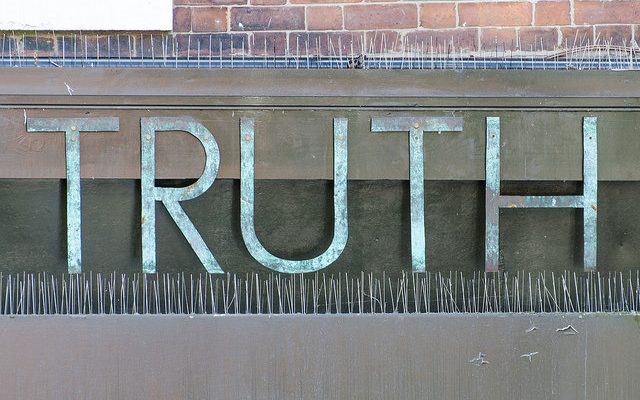BuzzFeed just published a piece demonstrating that post-factual tendencies in politics are alarming on the rise on hyperpartisan Facebook pages. Indeed, everybody is talking about post-truth democracy these days. Not a day goes by without a new diagnosis related to the post-factual society features in national and international media. Stories on Brexit, Trump, EU, crooked politicians, attacks on experts and researchers, and straight out neglect of evidence, make their ways to the headlines. Democracy is indeed challenged when it comes to the question of how to adequately handle facts. The thin red line between truthfulness and raw ideology seems increasingly unstable.
It’s time to set the record straight, clean up the terminology and clear up some misunderstandings. It’s too easy to derail the debate on post-factual democracy either because the diagnosis of the post-factual is seen as partisan politics or as a misconception of some particular historical period: “Once upon a time, politicians, journalists and researchers spoke nothing but the truth and citizens listened”. That’s not the way of the world, probably never was.
Nevertheless there is a pronounced tendency to envisage factual democracy as idealistic, utopian, perhaps even as a technocratic construction unrelated to the digital and social reality virtually everybody is part of now. It’s not that easy either. Factual democracy is not a fossil of the past nor a painting from the Golden Age elevating politicians, media, and experts of the past to contemporary role models. On the contrary, factual democracy is the very condition of possibility for democracy. Period.
In a number of recent contributions, we have claimed that “a democracy is in a post-factual state when truth and evidence are replaced by robust narratives, opportune political agendas, and impracticable political promises to maximize voter support”. The consequences of the definition are many and may dexterously warrant misunderstandings. So let us sort out a couple of the most widespread misreadings of the term post-factual society.
(1) Post-factual society is to be understood not as the successor to a factual society that seemingly never existed but as a society “beyond” factual declarations. There is no such thing as the Golden Age of democracy. Yet, there is a growing need to find the intellectual resources for handling facts in the information age, where selection of information, construction of narratives, political marketing, polarization and manipulation are potent means of communication. What we call factual democracy is to raise a challenge to the possibility of democracy as such: As citizens we are dependent upon truth-seeking media and politicians in order for us to participate in effective and transparent decision-making. Without transparency, evidence and reliable sources we don’t stand a chance of assessing the feasibility of political proposals. Instead, we are left with a maelstrom of messages accentuated by actors with the most tenacious means of communication. There are a lot of those and with very different interests and motives.
(2) The second misunderstanding is that post-factual democracy is somehow an expression of cultural pessimism: that democratic culture is in steady decline and that citizens just have to get used to the new era of lying. Or in the words of a recent editorial in The Economist: Politicians have always lied, what is new is that many now disregard reality entirely. While this undeniably seems to be the case, the democratic culture is strong and resilient. As part of this culture factual democracy is a central condition for having a deliberative democracy. As such it is celebrated by most Western societies independent of whatever political stance one chooses to adopt—Democrat, Republican, or whatever. Factual democracy is like a transcendental deduction: In a robust and smooth-running society, decisions must be fueled by reliable sources of information whether scientific evidence or commonly accepted facts based on testable methods. If questions arise about matters of fact, we turn to factual authorities, experts, and independent sources.
This doesn’t mean that there should be no room for ideology, cultural traditions, or diversity among moral viewpoints or religious doctrines. But it does entail that when factual questions arise in political debates, the facts to count are the ones produced by reliable and robust methods. Only by taking notice of the distinction between facts and norms, is it possible to engage in rational, enlightened and transparent dialogue—without fueling the fire of conspiracy and other misguided narratives advantageous for some political agendas, but untrue.
The political fact-checker platform Politifact recently listed five of the most significant falsehoods of the 2016 US election so far. Step by step and with facts in place it is unequivocally documented that
- It is false when Trump says that “The Mexican government forces many bad people into our country.”
- It is false when Clinton submits that “I never sent or received any classified material” on her private email server.
- It is false when Clinton announces that FBI Director “Comey said my answers were truthful, and what I’ve said is consistent with what I have told the American people.”
- It is false when Trump explains that he “released the most extensive financial review of anybody in the history of politics” and that “You don’t learn much in a tax return.”
- It is false when Trump says that he always was against the war in Iraq—even before it began.
As of September 16 the birthplace issue presumably has been put to rest by Trump admitting that Barack Obama was born in the US. At the same he falsely blames Hillary Clinton for initializing the rumour. One falsehood down just to be replaced by another—now the conspiracy question is the latter about who started the rumor as truth has triumphed over Trump on the former. Now the confessions of a Trump-fact checker just came out with falsehoods and inaccuracies in abundance—some 253 to be exact over a 33 days period.
(3) A third shortcoming of the current debate about post-factual democracy is the false impression that post-factual democracy is an expression of elitism: a classical struggle among the social classes for political position and prestige. But it is wrong to consider factual democracy as a technocratic ideal of the white-collar community that it can use strategically to bully ill-educated, ignorant or otherwise less privileged citizens.
From the ivory tower it would be an easy way out to say that “people don’t really know what they are saying yes to when they are supporting Donald Trump” or that the common citizens of Great Britain should have invested more time in figuring out “what was really up for vote in the Brexit referendum”. Clearly, figuring out what’s at stake is a good start. But when it is claimed that Brexit is an example of post-factual society it is not because the vote ended where it did, but because of the use of manipulation and distortion of facts during the campaign. An hour after the leader of the EU-critical UKIP, Nigel Farage, had called the election result a “victory for real people, a victory for ordinary people, a victory for decent people”, he had to admit in a TV interview that key numbers which had driven the Leave-campaign were incorrect. The Leave campaign had for instance promised to take the £350 million a week that the UK sent to the EU and spend it instead on National Health Services, going so far as to emblazon this vow on the side of a campaign bus. Confronted with this promise, Farage declared it had been a “mistake” and that he could not guarantee the funds would be redirected to the health fund.
(4) Another misunderstanding is to pay too much homage to the democratizing role of social media. Lots of ink has been spilled over the liberating forces of the web for marginalized groups living in authoritarian regimes. True, social media may indeed furnish new public spheres as real alternatives to state-governed media outlets. According to Harvard professor Yochai Benkler the digital public sphere allows for a new kind of bottom-up mobilization informed by universal access to knowledge free of government and corporate control. In many ways it is true that the digital public sphere provides a bullhorn for everybody and ways for citizens to inquire, examine, and cross-check information without having to go to the university library. Social media have immediate advantages and have created genuinely new possibilities of cooperation and knowledge dissemination. That being so—an emerging focal point is the potent tendencies which uncurated piles of information serve users up with.
Social media may amplify well-documented socio-psychological phenomena like pluralistic ignorance, bias, lemming-, polarization- and echo-chambers to whole new levels of reach and potency. Even assuming that users are individually rational it is still possible to be collectively dense. Just think of unsubstantiated shitstorms, Twitter-waves of hatred, polarized debates, online harassment and cyber-bullying.
Just because a growing number have access to the web it does not in and by itself guarantee that democracy has better living conditions. After all, the greatest asset traded on social media is people’s attention—and there are limits to how much attention floats around. And if you thought that people’s attention is dispersed in accordance with a normal distribution in a way that most users have more or less the same access to be heard and thus enjoy pretty much the same amount of attention, think again. Research shows that attention on the web does not follow a normal distribution but a power law.
In other words, a handful of big agents, mostly companies, have almost all the traffic and attention online while all other users including the established press, citizens, and politicians fiercely fight for whatever is left out in the tail of the power distribution. While at it, only 01% of the traffic online is devoted to politics, whereas 10% of the traffic has to do with adult content.
(5) Finally, we want to set the record straight on one last item of post-factual politics: We are neither cultural pessimists nor dead against technological developments. But our digital culture and social media have boosted traits in human cognition and behavior which makes it necessary to reflect upon the delicate relation between democracy, enlightenment, knowledge, and facts. It has been described as a new “human condition” that knowledge and expertise are today de-monopolized, that the number of competing sources, authorities, and experts has exploded, and that there is no longer a fixed point of the digital age where people agree on the facts.
It is a little more complicated than that. The knowledge institutions and authorities, which traditionally have been responsible for delivering facts, have multiplied. New players have joined working to political and economical ends rather than factual ones. Think tanks, politically appointed commissions, and expert groups of the private sector are exemplary.
In the 21st Century there is an entire industry for facts. Market surveys, opinion polls, statistical and economical models may all be mobilized to serve various political agendas depending on the goals and interests of involved companies, politicians and analysts. Since the 1990’s Western democracies have sought more “evidence-based policy” when it comes to health, education, and social issues. But a good spread of these programs have been governed by economics and based on certain ideological assumptions.
Of course, the distinction between normative and descriptive claims is sometimes blurred. There may be borderline cases in which there is disagreement about the factual base for informed decision-making or where established knowledge has turned out either insufficient or even wrong. Falsifiability is indeed a golden standard of human cognition. Now, politicians may disagree about which financial model is the correct one to pursue for resolving an issue at hand, but if they at least can agree that “the economy grew 1% in the last quarter” or that “unemployment is 5%” then there is a stable reality making political disagreement much more precise.
In this vein, William Davies, in New York Times, recently isolated a new threat to factual democracy. It is the transition from what he calls “evidence-based policy” to a “data-driven society”. Big data provides the opportunity of collecting massive amounts of data about the citizens’ sentiment in both the digital and analogue world, which later may be used to design much more precise marketing and political campaigns. As we leave behind footprints of preferences, opinions, and sympathies while moving around on the web and social media this data may be harvested. Such harvesting can, when properly processed, provide a pretty good idea of the users’ immediate state of mind also when confronted with new political propositions properly tailored to suit the citizens’ preconceived ideas.
While these huge data sets are not only used to plot reality but also applied as indicators of what is politically feasible to suggest, the grand societal challenges may disappear on the horizon. How is democracy to solve the grand challenges if it is the immediate state of mind of users determining the seriousness of the problems at hand? Anger, fear and indignation create a lot of traffic and social transmission. Thus it may be opportune for a particular political agenda to get people off the couch with mobilizing sentiments independently of whether these feelings are justified.
It is precisely this psychological environment in which citizens lose faith in politicians and migrate to alternative sources of information and polarize in opinion groups—some marked by religious fanaticism, others by conspiracy. Now, if politicians and private data outlets start slighting the ability of citizens to engage in enlightened democratic discourse, citizens equally will start to slight the political establishment. The way out of this information borne Byzantine tangle is not a technocracy or a government of experts but a more enlightened and involving democracy. The threat to factual democracy is real. But enlightenment, truth, and transparency have worked before and will again be the best antidote to post-truth society.
November 3, 2016
Featured image courtesy of Tim Abbott on Flickr.






